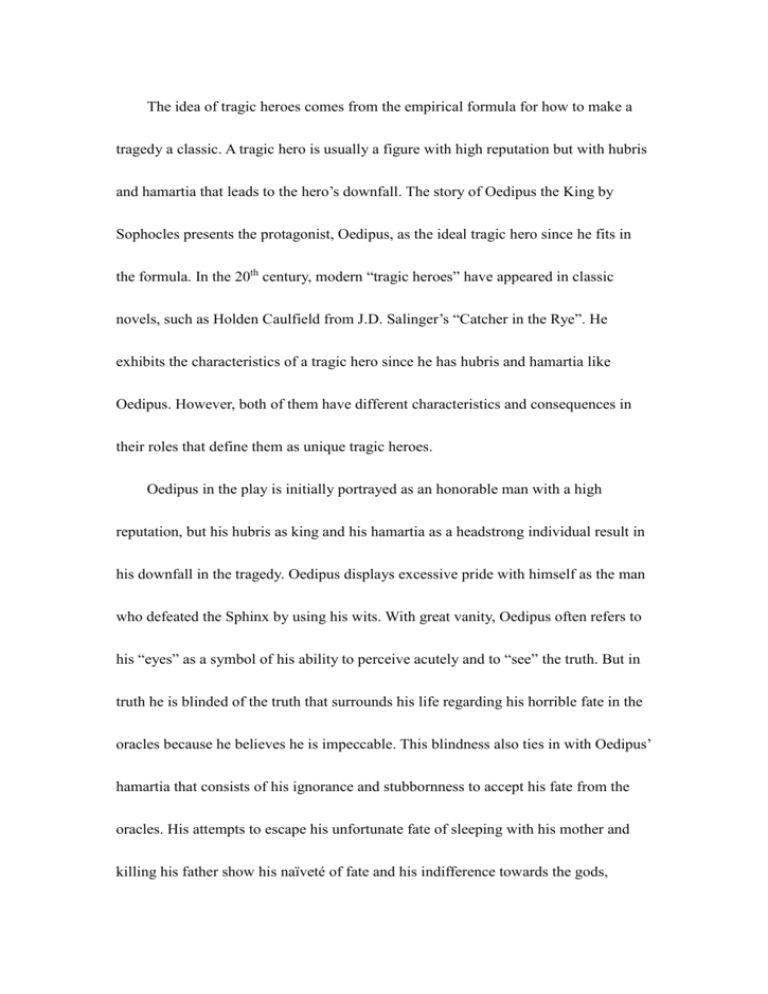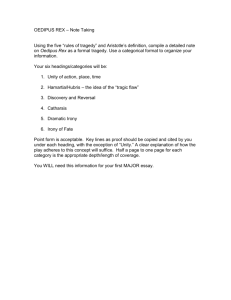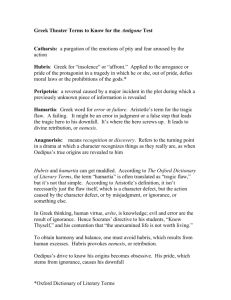Tragic hero comparison
advertisement

The idea of tragic heroes comes from the empirical formula for how to make a tragedy a classic. A tragic hero is usually a figure with high reputation but with hubris and hamartia that leads to the hero’s downfall. The story of Oedipus the King by Sophocles presents the protagonist, Oedipus, as the ideal tragic hero since he fits in the formula. In the 20th century, modern “tragic heroes” have appeared in classic novels, such as Holden Caulfield from J.D. Salinger’s “Catcher in the Rye”. He exhibits the characteristics of a tragic hero since he has hubris and hamartia like Oedipus. However, both of them have different characteristics and consequences in their roles that define them as unique tragic heroes. Oedipus in the play is initially portrayed as an honorable man with a high reputation, but his hubris as king and his hamartia as a headstrong individual result in his downfall in the tragedy. Oedipus displays excessive pride with himself as the man who defeated the Sphinx by using his wits. With great vanity, Oedipus often refers to his “eyes” as a symbol of his ability to perceive acutely and to “see” the truth. But in truth he is blinded of the truth that surrounds his life regarding his horrible fate in the oracles because he believes he is impeccable. This blindness also ties in with Oedipus’ hamartia that consists of his ignorance and stubbornness to accept his fate from the oracles. His attempts to escape his unfortunate fate of sleeping with his mother and killing his father show his naïveté of fate and his indifference towards the gods, especially Apollo, the god of prophecy. At one point of the play, Oedipus illustrates his triumph over the gods by bragging his supremacy of escaping his fate, “So we are done with delving into Pythian oracles…with all those prophecies-worth nothing now” (Sophocles 245). Later on in the climax when Oedipus realizes that he inadvertently killed his father, Laius, in a crossroads while escaping his “hometown” of Cornith and that Jocasta is actually the wife of Laius, he is flabbergasted and stunned by this peripeteia and cries out “At last it’s blazing clear…I want to gaze no more” (Sophocles 253). He then gouges his eyes after finding out that Jocasta hanged herself after she knew Oedipus is her son. This display of characteristics by Oedipus proves that he deserves to be deemed an ideal tragic hero who was held in honor and suffered a great fall due his hamartia and hubris. Fast forward to New York City in the Mid-20th century, we are presented with Holden Caulfield, the tragic hero in the modern generation. Like Oedipus, Holden has hubris and hamartia that portray his arrogance and his blindness to his own flaws. As a cantankerous adolescent, he possesses an abundance of vanity and despises the “phony” and “corny” society that surrounds him, marking his hubris. After being expelled from Pency’s, his boarding school, he wanders around New York City criticizing the people and the customs that surrounds his life. At a bar he criticizes a pianist’s playing and he goes even further and slanders the crowd as the people who “laugh like hyenas in the movies at stuff that isn’t funny” (Salinger 91). He summarizes his experience by stating “I’m surrounded by jerks” (Salinger 92), displaying Holden’s hubris due to his subordination of others. Holden’s hamartia on the other hand results from his hubris as he is ignorant of his erroneous behavior and his stubbornness to change himself. During a conversation with his History teacher, Mr. Spencer, he pretends to feel guilty about his behavior while in truth he “shot the bull for a while…told him I was a real moron…that kind of stuff, the old bull” (Salinger 13). Consequently, he is headstrong in following his beliefs that he fails support them with reason. When Phoebe, his little sister, states that Holden “doesn’t like anything that’s happening” (Salinger 182), Holden is unable to think of anything to refute Phoebe’s comment because he is clueless of the fact that people who met Holden detests Holden’s impulsive behavior. Holden yearns for companionship once he escaped from Pency’s. Instead, he is rejected by society because he can’t accept the customs and the “phoniness” in his life. Because of this, he gets in trouble by insulting his date, Sally Hayes, and getting conned by a hotel elevator man. As a result, Holden suffers a great fall in the novel as he experiences isolation and alienation in New York City, much like Oedipus. Although Oedipus and Holden Caulfield are labelled as tragic heroes due to their hubris and hamartia, there are differences that distinguish these characters as unique individuals. Oedipus explicitly shows his authority since he was king and refuses to be challenged by anyone. Holden, however, kept all his criticism to himself while interacting with others, a form of authority that Holden has done throughout the novel. In addition, Oedipus is a man of high honor since he has solved the riddle of the Sphinx and saved the town of Thebes. Holden on the other hand has no reputation at all, just an angry teenager who leaves a bad impression on everyone. Even though their ranks are remarkably different, they still have hubris because of their excessive pride in themselves that define them as tragic heroes. Lastly, their peripetias that mark their change of fortune are opposite. Oedipus, who later finds out that he accidently fulfilled his oracle of sleeping with his mother and killing his father, is shunned by such turn of events since it defies his wisdom and his ability to “see”, he gauges his eyes and is banished from Thebes as a result of his fortune. Holden has a more positive light on his fortune. Even though he has suffered pain and isolation during his wanderings in New York City, Holden has shown some effort to acknowledge his flaws and to amend them. He attempts to receive help and advice from his sister Phoebe and his teacher Mr. Antolini in order to search for direction in his life and Holden even accepts treatment for his unstable behavior, showing his peripeteia from bad to good. Both of these characters have lasted for eternity in the world of literature because of their unique aspects about their personality. But while comparing both “Oedipus the King”, and “Catcher in the Rye” as a whole, I realize that there is still one more aspect that relates the characters together, the use of catharsis for the readers. Both plots were very intricately structured that the characters were able to fit in the story and move with the flow, making each chapter of the story relevant to how the character develops throughout the story. As the readers follow along with the character’s progression, they can feel empathy for the characters such as Oedipus’ realization of his origin and Holden’s interactions with Mr. Antolini to search for directions. At the end of the novel the readers feel as if it’s the end of the roller coaster, an emotional ride that has an anticipating rising action, a superb climax and a soothing conclusion. As a result, the readers have the urge to repeat the ride, to relive the sensation of catharsis. No matter how different customs were in 20th century New York and 500 B.C.E. Thebes, the ideal tragic heroes will carve itself in the heart of ancient and modern society as the basis for works of literature. Bibliography: Sophocles. Sophocles: The Complete Plays. Trans. Paul Roche. New York: Signet Classics, 2001. Print. Salinger, J. D. The Catcher in the Rye. New York: Penguin Books, 2010. Print. A Comparison of Tragic Heroes: The Mark of a Mature and Immature Man Henry Lee 18 Mr. de Groof Grade 12 10/3/14






